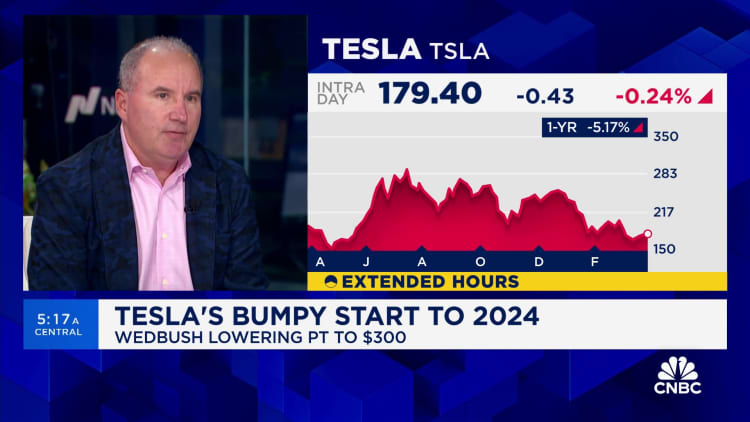
Tesla and SpaceX CEO Elon Musk.
Kirsty Wigglesworth | Reuters
Tesla shares fell on Tuesday after the company reported a drop in vehicle deliveries in the first quarter, the first annual decline since 2020, when the global pandemic disrupted production.
Here are the key numbers:
Total deliveries Q1 2024: 386,810
Total production Q1 2024: 433,371
Vehicle production declined around 1.7% from a year earlier and 12.5% sequentially for Tesla, not nearly as steeply as the 8.5% annual drop in deliveries.
Tesla doesn’t break out sales by model but reported it produced 412,376 Model 3/Y cars and delivered 369,783. It produced 20,995 of its other models and delivered 17,027.
In the same period last year, the electric automaker reported 422,875 deliveries and production of 440,808 vehicles. In the fourth quarter of 2023, Tesla reported 484,507 deliveries and production of 494,989 vehicles.
Deliveries are the closest approximation of sales reported by Tesla but are not precisely defined in the company’s shareholder communications.
Tesla’s deliveries for the quarter fell far below even the most bearish of analysts’ expectations.
According to a mean of 11 estimates compiled by FactSet, analysts were expecting deliveries of around 457,000 for the period ended March 31. Estimates ranged from a high of 511,000 deliveries to a low of 414,000 for the first quarter, with estimates updated in March ranging from 414,000 to 469,000 deliveries.
Independent auto industry researcher Troy Teslike, whose work is closely followed by Tesla fans, had expected deliveries to come in around 409,000.
Tesla’s head of investor relations, Martin Viecha, sent around a company-compiled consensus based on 30 analysts’ estimates over the weekend to select investors. The consensus, which was viewed by CNBC, said analysts were expecting a mean of 443,027 deliveries and a median of 431,125 deliveries for the quarter.
Tesla faced numerous challenges in the first quarter.
Houthi militia attacks on shippers in the Red Sea disrupted Tesla’s component supply and temporarily suspended production at its German factory outside of Berlin in January. In March, environmental activists set fire to infrastructure near that same factory, depriving Tesla of sufficient operation power and again causing a pause in production.
Tesla said in a statement that “decline in volumes was partially due to the early phase of the production ramp of the updated Model 3 at our Fremont [California] factory and factory shutdowns.”
In China, Tesla faced an onslaught of competition from domestic EV makers, including BYD and newcomers such as the phone maker Xiaomi. After sluggish sales numbers for its China-made cars in January and February, Tesla reduced production of its Model 3 and Model Y at its Shanghai plant and slashed workers’ schedules to five days a week from 6½ days.
In the U.S., reviews were mixed for Tesla’s newest model — an angular pickup dubbed the Cybertruck — which the EV maker only began to sell in small numbers in December last year.
A series of discounts and incentives appeared to be less effective in driving sales volume than in the past for Tesla.
During the final days of the first quarter, Tesla CEO Elon Musk mandated that all sales and service staff install and demo the newest version of the company’s premium driver assistance system for customers in North America before handing over their cars. The system is marketed as Full Self-Driving but doesn’t make Tesla cars autonomous. They require a human at the wheel, ready to steer or brake at any time.
Prospective Tesla customers in the U.S. comprised a shrinking group in the first quarter of 2024, according to a report by Reuters citing survey data from Caliber. The report attributed the drop in part to Musk’s persona.
Musk has continued to bet that Tesla customers and shareholders will stick with the brand and company regardless of his politics and incendiary rhetoric on and beyond X, which he owns.
Shares of Tesla dropped 29% in the first quarter, the biggest decline since the end of 2022 and the third-steepest quarterly plunge since the company’s IPO in 2010. Tesla stock closed down about 5% on Tuesday at $166.63 per share.
The company has scheduled an earnings call for April 23 to discuss quarterly results.


